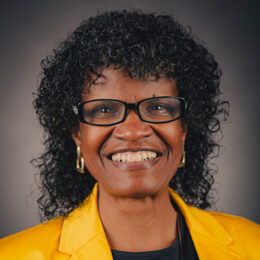Diversity & Inclusion
Explore the systems that shape society with Manchester University’s diversity and inclusion minor. Open to all majors, this program equips you with the critical thinking, cultural intelligence, and advocacy skills needed to address inequality and build more inclusive communities—locally, nationally, and globally.

Pursue a Diversity and Inclusion Minor That Complements Any Major
Manchester University’s diversity and inclusion minor helps students examine the social, structural, and cultural forces that impact equity in modern society. Open to students of any major, this interdisciplinary program explores critical topics such as systemic racism, health care disparities, mass incarceration, and inequality in education. Through coursework grounded in sociology, social work, and criminology, you’ll develop the tools to analyze power structures, understand intersecting identities, and challenge systems of marginalization. Whether your future is in public service, education, business, or health care, this minor enhances your ability to foster inclusive environments and lead meaningful change.
Program Information:
- 18 Credit Hours
Location
- North Manchester
Why Choose MU for Diversity and Inclusion?

Open to All Majors
Real-World Career Relevance
Mission-Driven Learning Environment
What You Can Do with Your Diversity & Inclusion Minor
Public Policy Analyst
Shape inclusive policy solutions that address systemic inequality and injustice.
Community Organizer
Empower communities to advocate for equity and inclusive change.
Human Services Specialist
Support diverse populations through inclusive social and educational programs.
Business Administrator
Promote equity-focused leadership in organizational development and culture.

Average Starting Salary for Diversity & Inclusion Minor Holders
Entry‑level Diversity, Equity & Inclusion (DEI) Specialists in the U.S. typically start around $68,000–$72,000 per year, with reported ranges from $60,000 to $80,000 depending on location, experience, and organization type. Those in mid‑ to senior‑level roles can see salaries up to $90,000–$100,000. These figures reflect the value organizations place on expertise in equity and inclusion.

How the Diversity & Inclusion Minor Supports Your Growth
Intersectionality and Identity Development
Systems of Inequality and Cultural Humility
Reimagining Equity and Social Reform
Student Groups and Interdisciplinary Exploration
Meet the Faculty
FAQs About Manchester University’s Diversity & Inclusion Minor
What is the Diversity and Inclusion Minor at Manchester University?
Students explore critical issues such as mass incarceration, inequality in school funding, global health issues, and disparities in healthcare access. The curriculum supports students interested in understanding ethnic relations and the structural roots of injustice, preparing them for roles in education, law, business, and public service. This minor also cultivates critical thinking and analytical skills through real-world case studies and community-focused learning.
By completing the Inclusion Studies minor, students develop cultural intelligence and gain tools to engage diverse populations, advocate for equity, and challenge exclusionary systems. Whether your goal is to influence public opinion, reform the criminal justice system, or lead DEI initiatives in your career, this program equips you with the necessary foundation to create meaningful change across diverse communities.
Who Should Consider Adding a Cultural Diversity or Inclusion Studies Minor?
This inclusion studies minor is valuable for students planning careers in education, healthcare, nonprofit management, public policy, and the criminal justice system. Employers increasingly value applicants with expertise in diversity, equity, and inclusion (DEI), and this minor signals your readiness to lead with empathy, cultural humility, and ethical responsibility.
In addition, students explore how ethnic groups and gender identity shape lived experiences in the modern world. You’ll become familiar with the cultural, historical, and social construction of identity, helping you thrive in team-based, community-centered, or leadership roles. Whether your career goals lie in local advocacy or international service, the Diversity and Inclusion minor prepares you to work effectively within—and across—diverse communities.
How Does the Inclusion Minor Support My Future Career Goals?
Courses explore issues such as institutional racism, health disparities, global poverty, and gender inequality. Students learn to advocate for inclusive workplace practices, assess the impact of policy decisions, and understand how human diversity influences behavior and access to resources.
Whether you’re pursuing leadership in business, serving in local government, or entering the nonprofit world, the inclusion studies minor demonstrates your commitment to ethical leadership and equity-centered decision-making. Many graduates go on to roles involving program coordination, cultural advocacy, or DEI implementation—careers that not only offer personal fulfillment but also serve a meaningful societal purpose.
What Will I Learn in the Inclusion Studies Minor?
Through courses in sociology, behavioral sciences, and ethics, students examine how institutions like the criminal justice system, healthcare, and education perpetuate inequality. They learn to evaluate public opinion and propose practical reforms based on equity and inclusion. By engaging with diverse perspectives, students cultivate empathy and communication skills necessary for fostering respectful, inclusive environments.
The minor also emphasizes social change. Students analyze current issues, evaluate reform strategies, and design proposals that address structural inequities. Whether you’re preparing for further study in inclusion studies or looking to apply your knowledge in real-world contexts, this program equips you with tools to lead with purpose.
How Is the Inclusion Minor Different From Other Diversity Programs?
What makes this inclusion studies minor unique is its flexibility and academic depth. It’s open to all majors and allows students to integrate DEI perspectives into fields ranging from STEM and business to the arts and healthcare. It familiarizes students with the underlying systems of discrimination, helping them build nuanced, culturally informed approaches to leadership and service.
Students also gain practical, hands-on experience analyzing real-world social problems such as ethnic tensions, global health issues, and media bias in popular culture. Rather than simply discussing diversity, students are empowered to create inclusive spaces, implement change, and advocate for justice across a wide range of careers.
What Careers Can I Pursue With a Minor in Diversity and Inclusion?
Students who complete the Diversity and Inclusion minor are prepared for dynamic careers across sectors that value cultural competency and social impact. Common career paths include:
- Human Resources Specialist – Lead inclusive hiring and workplace equity initiatives.
- Community Outreach Coordinator – Build bridges between diverse communities and service organizations.
- Public Policy Analyst – Evaluate laws and policies through the lens of equity and human diversity.
- Healthcare Advocate – Address health disparities by supporting marginalized populations in medical systems.
- Criminal Justice Reform Advocate – Work on reducing systemic bias and increasing access to fair legal representation.
- Educator or Curriculum Consultant – Develop inclusive education practices for diverse classrooms.
Employers in education, public administration, nonprofit management, and business actively seek candidates trained in DEI, making this minor a powerful complement to your bachelor’s degree.
What types of courses are included in the minor in Diversity and Inclusion?
The inclusion minor diversity track is interdisciplinary by design. It incorporates coursework from sociology, social work, and criminology, and may include the following courses: Introduction to Sociology, Race and Ethnic Relations, Social Problems, Cultural Anthropology, and Gender Studies. These classes are chosen to provide students with both historical context and current analysis of societal inequities.
Students who pursue this minor diversity pathway will engage in assignments that explore structural discrimination, cross-cultural communication, and real-world case studies. The program is specifically designed to provide students with analytical tools, cultural fluency, and the ability to apply theory to action in diverse workplace and community environments.
Completing the minor diversity also positions students for success in graduate programs or DEI roles in education, health care, business, and public administration. With the minor diversity, students are empowered to lead inclusion-focused initiatives and create more equitable systems across sectors.
Non-Discrimination in the Admission Process
Manchester University is committed to non-discrimination in campus life. The University does not discriminate on the basis of national origin, ancestry, race, color, age, sex, gender identity or expression, sexual orientation, familial status, religion, disability or veteran status in admissions or any area of campus life, including its educational programs, scholarships and loan awards, residence life programs, athletic programs, extracurricular programs, promotion and tenure policies and practice, and alumni affairs.
Manchester University is committed to carry out the provisions of Section 504 of the Rehabilitation Act of 1973 and the Americans With Disabilities Act, which provide for accessibility of University programs to the physically disabled.









